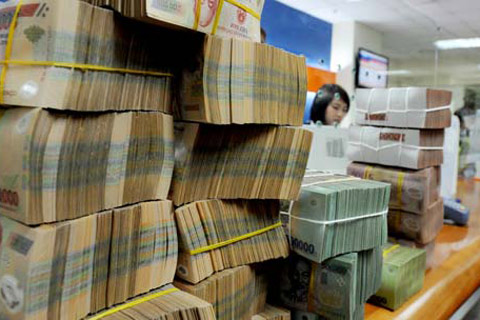Record high overseas remittances

illustration photo
According to the State Committee for Overseas Vietnamese, there are currently five million Vietnamese living and working abroad. Hardworking money is thus sent back to Vietnam for family members and investment opportunities.
Improvements in government policies and bank transfer services in recent years have helped boosting overseas remittances. In particular, the abolition of income tax on overseas remittances in 2007 and limitation on money transfer has facilitated overseas Vietnamese to buy properties and invest in Vietnam.
According to Vo Tri Thanh, deputy director of the Centre Institute for Economic Management (CIEM), overseas remittances in 2008 reached $7.2 billion and over the past years, the amount climbed up to $12 billion in 2014, a record high.
The SBV last week forecasted that Vietnam would receive between $13 billion and $14 billion in overseas remittances this year.
Since 1991 when the country opened its trade, official overseas remittances have dramatically grown nearly 40 per cent, crowning Vietnam as one in 10 countries receiving the biggest amount of overseas remittances in the world.
Patricia Z. Riingen, senior vice president of ASEAN and Pacific region of Western Union, shared that Vietnam’s overseas remittances have grown impressively. Vietnam received overseas remittances from only 16 countries in 1991, in 20 years time, the number of countries and territories have edged up to 187.
In comparison to foreign direct investment (FDI) or official development assistance (ODA), overseas remittances are considered as a stable source of foreign currency. Many experts thus commented that FDI and ODA fund could change due to economic crisis, fund withdrawals and debt repayments, overseas remittances on the other hand once poured into the country; it is unlikely to flow out yet contribute directly to the country’s economy.
To many families that received overseas remittances from their relatives living and working abroad, the money will be partly used for their living expenses and the rest will be reinvested into production, real estate and stock market.
“We all depend on the money that our daughter sends us each month from Germany. Nearly half of the amount will be paid for our home mortgages and the rest will be deposited in bank and spent on household expenditures”, said Bui Minh Thuan, a Nam Dinh resident in a phone interview with VIR.
Overseas remittances also play a bigger role in boosting savings and investment, reducing debt payments and at the same time helping improving the country’s credit ratings, stabilising forex rates, balance of payments and foreign exchange reserves.
Remittances from overseas Vietnamese remain a key part of the country’s economy, equivalent to about eight per cent of gross domestic product and more than 50 per cent of the amount comes from the US, according to statistics data.
What the stars mean:
★ Poor ★ ★ Promising ★★★ Good ★★★★ Very good ★★★★★ Exceptional
Latest News
More News
- Vietnamese businesses diversify amid global trade shifts (February 03, 2026 | 17:18)
- Consumer finance sector posts sharp profit growth (February 03, 2026 | 13:05)
- Vietnam and US to launch sixth trade negotiation round (January 30, 2026 | 15:19)
- NAB Innovation Centre underscores Vietnam’s appeal for tech investment (January 30, 2026 | 11:16)
- Vietnam moves towards market-based fuel management with E10 rollout (January 30, 2026 | 11:10)
- Vietnam startup funding enters a period of capital reset (January 30, 2026 | 11:06)
- Vietnam strengthens public debt management with World Bank and IMF (January 30, 2026 | 11:00)
- PM inspects APEC 2027 project progress in An Giang province (January 29, 2026 | 09:00)
- Vietnam among the world’s top 15 trading nations (January 28, 2026 | 17:12)
- Vietnam accelerates preparations for arbitration centre linked to new financial hub (January 28, 2026 | 17:09)
















 Mobile Version
Mobile Version